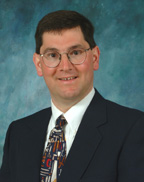 UNMC has become the fifth site in the U.S. to enter into a clinical trial with Aastrom Biosciences, Inc., to determine if special adult stem cells can help speed the healing of severe leg fractures and eliminate the need to do painful bone grafting procedures.
UNMC has become the fifth site in the U.S. to enter into a clinical trial with Aastrom Biosciences, Inc., to determine if special adult stem cells can help speed the healing of severe leg fractures and eliminate the need to do painful bone grafting procedures.
Candidates for the Phase I/II trial are patients with open or non-union fractures of the long bones in the leg. Open or non-union fractures are ones that haven’t completely healed within four months.
“Treatment options are limited for these individuals,” said Matthew Mormino, M.D., associate professor and residency program director in the UNMC Department of Orthopaedic Surgery and Rehabilitation and principal investigator at the UNMC site. “The normal course is to try to achieve fracture healing through bone grafting. This can be quite painful. It involves removing part of the patient’s pelvis bone and then surgically implanting the bone particles in the area of the fracture non-union. About 90 percent of the time, the bone particles will graft with the existing bone and healing will occur.”
The clinical trial is much more patient-friendly, Dr. Mormino said. It begins with the collection of a sample of bone marrow from the patient’s hip in an outpatient setting. The adult stem cells (unspecialized cells) and progenitor cells (partially specialized cells) derived from the bone marrow are then placed in a device called the AastromReplicell” System, which transforms the cells into Tissue Repair Cells (TRCs) over a 12-day period. These TRCs are then inserted during a surgical procedure into the fracture site. These cells are designed to act as bone forming cells and promote healing of the open or non-union fracture.
“This study explores the osteogenesis aspect of bone formation. We want to determine the viability of these Tissue Repair Cells in promoting healing in difficult leg fractures,” Dr. Mormino said. “If this trial proves successful, this procedure will provide an effective alternative to current bone grafting procedures. It would represent a major breakthrough for dealing with these difficult cases.”
Over the next few months, UNMC will be able to enroll patients in the trial. A total of at least 20 subjects around the country will be enrolled in the study. The other four study sites are: Lutheran General Hospital, Park Ridge, Ill., University of Michigan Health System, Ann Arbor, Mich., William Beaumont Hospital, Royal Oak, Mich., and Lutheran Medical Center, Brooklyn, N.Y.
In May 2005, Aastrom announced the results from a similar feasibility clinical trial conducted with the Institut de Terapia Regenerativa Tisular (ITRT) in Barcelona, Spain. In this trial, five of six patients treated with TRCs exhibited clinical and functional healing as determined by radiographic imaging within six months. The results from the Barcelona trial were notable in that each patient had failed prior treatment with standard of care methodologies and had a poor prognosis for healing.
The U.S. clinical trial is being completed under an Investigational New Drug permit issued by the FDA. Following the achievement of successful safety and bone formation progress in both the U.S. and Barcelona clinical trials, Aastrom was recently able to revise the U.S. trial protocol to include a broader range of fracture indications and may now enroll patients with fresh fractures as well as those with long-term, non-healing fractures. Aastrom’s TRCs are also being used in a clinical trial in Spain for jaw bone reconstruction preparatory to maxillary sinus lift procedures, to generate sufficient jaw bone for successful dental implants.
Edward Fehringer, M.D., will join Dr. Mormino as co-investigator at the UNMC trial site. For more information, call Connie Feschuk, nurse research coordinator, at (402) 559-4167 or visit Aastrom’s Web site at www.aastrom.com.